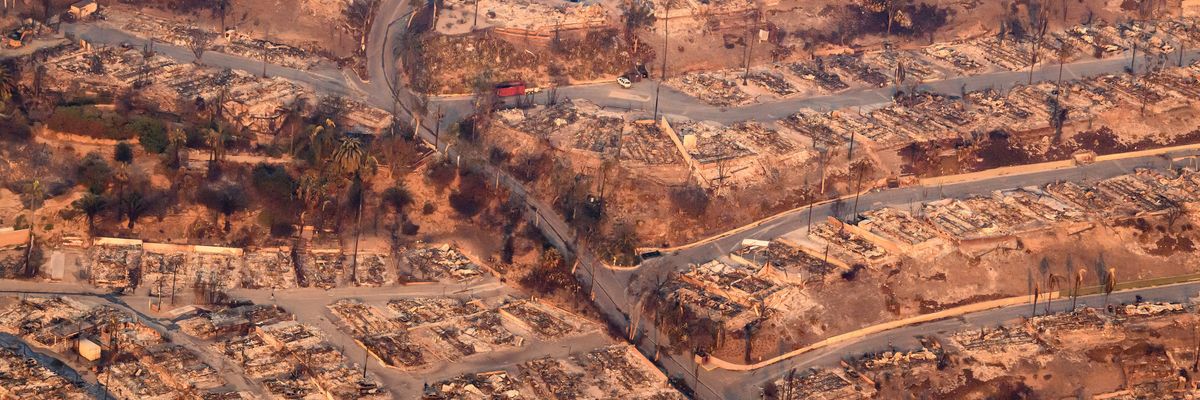"Will this be the event that finally wakes everyone up?" wondered climate scientist Peter Kalmus on Thursday, with Los Angeles in its third day of multiple fires consuming large swaths in and around the city, forcing residents to flee and leaving destruction in their wake.
Late Thursday, the Los Angeles Times, citing officials, reported that at least 10 people have been killed by the blazes and upward of 9,000 homes, businesses, and other buildings appear to have been destroyed or damages in the two largest fires, the Palisades and Eaton fires.
The fires, now in their fourth day and still largely not contained, could be "at least collectively, the costliest wildfire disaster in American history," Daniel Swain, a climate scientist at the University of California, Los Angeles told the LA Times.
AccuWeather, a weather data and news company, on Thursday estimated damage and economic losses from the fires at $135-150 billion. A JPMorgan analyst, Jimmy Bhullar, gave a smaller figure to The Wall Street Journal on Thursday. He said that losses from the fires are pegged "close to $50 billion."
AccuWeather chief meterologist Jonathan Porter said that "fast-moving, wind-driven infernos" have spawned "one of the costliest wildfire disasters in modern U.S. history."
"To put this into perspective, the total damage and economic loss from this wildfire disaster could reach nearly 4% of the annual GDP of the state of California," Porter said.
For comparison, Hurricane Katrina, which devastated parts of the American South including New Orleans in 2005, cost $101 billion in 2023 dollars, according to the Insurance Information Institute, citing numbers from the insurance company Aon (other sources have put the cost of Hurricane Katrina at higher).
All told, the California Department of Forestry and Fire Protection counts five "currently active incidents" of fires burning in Los Angeles County. The Palisades Fire, which has so far burned over 20,000 acres, is 8% contained, and the Eaton Fire, which has burned more than 13,000 acres, is 3% contained. The Kenneth Fire, which has grown to 1,000 acres, is 35% contained. Two smaller fires, the Hurst Fire and the Lidia Fire, are 37% and 75% contained, respectively.
One homeowner in the Pacific Palisades remarked that his neighborhood "looks like Berlin—or it looks like some part of World War II...Everything is burned down. It’s just terrible."
The fire are also expected to deepen California's insurance crisis. San Francisco Chronicle reporting from last summer on data from 10 of the largest insurance companies revealed that more than 100,000 Californians lost their home insurance between 2019 and 2024. Insurance companies "overwhelmingly cited" wildfire risk as the reason for rolling back coverage.
California Insurance Commissioner Ricardo Lara on Thursday issued a one-year moratorium on homeowners insurance nonrenewals and cancellations for ZIP codes impacted by the fires.




